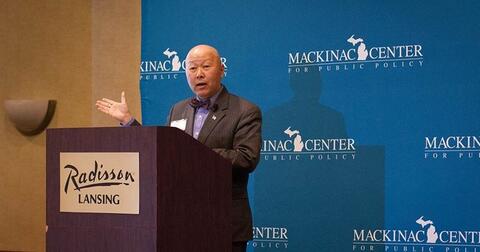Affluent School Districts Don't Guarantee Better Academic Performance
Some parents in affluent Michigan school districts may be surprised to learn the local school isn’t just failing to give their kids a leg up, it’s holding them back. New research shows that a number of Michigan schools in middle- to upper-income areas are underperforming on state and national proficiency exams.
In eighth-grade math, for example, 58 percent of Michigan students failed to score at the proficient level on the National Assessment for Education Progress.
“We’re trying to lift the stone so parents can see what is underneath,” said Lance Izumi of the Pacific Research Institute. Izumi, along with Alicia Chang, is the author of “Not As Good As You Think: Why Middle-Class Parents in Michigan Should be Concerned About Their Local Public Schools.”
Izumi and Chang began their research in 2007 looking at California public schools in which one-third or fewer of the students were eligible for the federal free- or reduced price-lunch program, the usual school proxy for low-income backgrounds. Students from higher-income homes face fewer socio-economic challenges and typically get more educational support at home, including tutoring.
The expectation is that the schools they attend would be outperforming. But many are not.
Izumi and Chang looked at data in other states, including Michigan, and what they found might surprise parents.
“Of the 677 regular public schools with predominantly non-low income student populations, 534 — 79 percent — had at least one grade level where the subject-matter proficiency rate on the MEAP or MME was below the average performance of schools with the same student-income-status demographic,” said Izumi, referring to Michigan’s statewide student assessments.
Izumi says all it takes is a below-average performance by just one grade in one subject test to indicate there is a problem with the school. That is because an underperforming classroom or teacher can have years of residual effect.
“We’re finding a number of students not prepared for college at the community college level, not even University of Michigan or Harvard,” Izumi said, adding that many college students need remedial math or English to make up for what they didn’t learn in middle and high school.
The report cites a number of schools in higher-income districts not performing at proficient levels, including Grosse Pointe North High School, Scranton Middle School in Brighton, South Lyon High School, Caledonia High School, and Hudsonville High School.
At Grosse Pointe North High School, for example, more than 59 percent of 11th-graders failed to meet the proficient level on the 2012-13 Michigan Merit Exam. The median household income in Grosse Pointe Woods, where the high school is located, is 78 percent higher than the statewide median income of $46,859.
“You think you have it made when you move to these districts. You see the few kids going to Harvard, and you assume the school will get all students to that level, and that’s just not the case,” said Izumi.
Izumi says math seems to be where the biggest deficiencies lie. The reading portion of the MME appears less rigorous than comparable tests in other states, so Michigan students get higher scores on it. Yet 55 percent of higher-income students failed to score at the proficient level in reading on the National Assessment for Educational Progress. Eighth-graders in Ohio scored better on the NAEP than those in Michigan in both math and reading.
Izumi says parents need to dig deeply into the data on proficiency exams before assuming that their children’s educational needs are being met.
Izumi says his findings suggest that kids in attractive but low-performing public schools need options right now, not some time in the future, and that means more school choice opportunities, including more charter schools, digital learning, school vouchers and tuition tax credits.
“The school choice model has worked in struggling urban areas. There is no reason to believe it won’t work elsewhere,” said Izumi.
He noted that when parents have more options they tend to take a more vested interest in where their child attends school and how their child performs. He also mentioned that Michigan needs to look at how much parents are spending on tutoring.
“If we account for that, we may find that schools are doing worse than they should be,” he said.
~~~~~
Here is a video replay of the event:
Michigan Capitol Confidential is the news source produced by the Mackinac Center for Public Policy. Michigan Capitol Confidential reports with a free-market news perspective.


 Michigan pushes $762M pre-K expansion while K-12 performance declines
Michigan pushes $762M pre-K expansion while K-12 performance declines
 Whitmer admits education system failing despite increased spending
Whitmer admits education system failing despite increased spending
 State superintendent asks Michigan lawmakers for home school registry
State superintendent asks Michigan lawmakers for home school registry